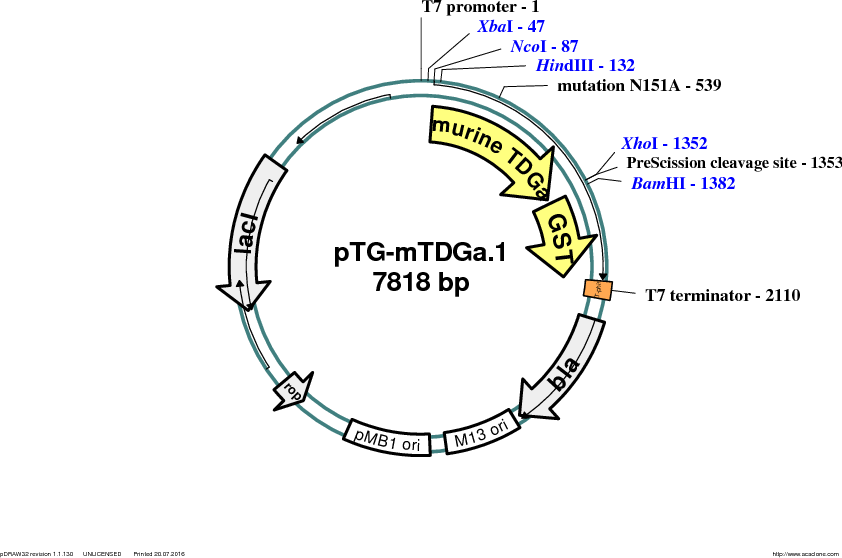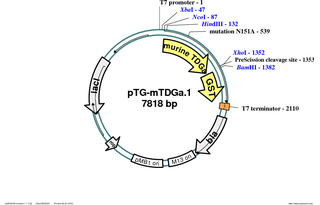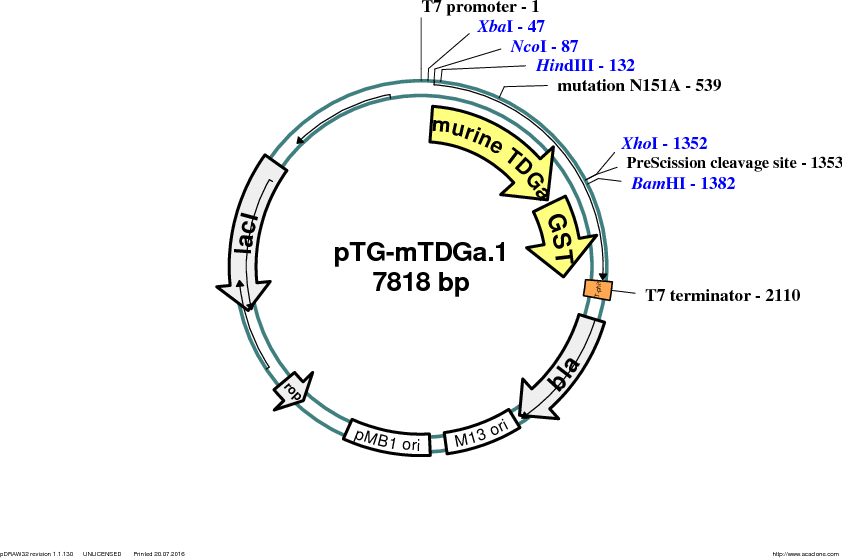pTG-mTDGa.1
(Plasmid
#81049)
-
Purposebacterial expression of catalytically dead murine TDG
-
Depositing Lab
-
Sequence Information
Ordering
| Item | Catalog # | Description | Quantity | Price (USD) | |
|---|---|---|---|---|---|
| Plasmid | 81049 | Standard format: Plasmid sent in bacteria as agar stab | 1 | $85 | |
Backbone
-
Vector backbonepTXB3
-
Backbone manufacturerNew England Biolabs
- Backbone size w/o insert (bp) 6550
- Total vector size (bp) 7818
-
Modifications to backboneMxe GyrA intein-CBD replaced by PreScission cleavage site and GST
-
Vector typeBacterial Expression
Growth in Bacteria
-
Bacterial Resistance(s)Ampicillin, 100 μg/mL
-
Growth Temperature37°C
-
Growth Strain(s)DH5alpha
-
Copy numberLow Copy
Gene/Insert
-
Gene/Insert nameTDG
-
SpeciesM. musculus (mouse)
-
Insert Size (bp)1263
-
Mutationasparagine 151 changed to alanine
-
GenBank IDNM_011561.2
-
Entrez GeneTdg (a.k.a. E130317C12Rik, JZA-3, Jza1)
- Promoter T7
-
Tag
/ Fusion Protein
- GST (C terminal on backbone)
Cloning Information
- Cloning method Restriction Enzyme
- 5′ cloning site NcoI (not destroyed)
- 3′ cloning site XhoI (not destroyed)
- 5′ sequencing primer T7_promoter
- 3′ sequencing primer T7_terminal_primer (Common Sequencing Primers)
Terms and Licenses
-
Academic/Nonprofit Terms
-
Industry Terms
- Not Available to Industry
Trademarks:
- Zeocin® is an InvivoGen trademark.
These plasmids were created by your colleagues. Please acknowledge the Principal Investigator, cite the article in which the plasmids were described, and include Addgene in the Materials and Methods of your future publications.
-
For your Materials & Methods section:
pTG-mTDGa.1 was a gift from Primo Schaer (Addgene plasmid # 81049 ; http://n2t.net/addgene:81049 ; RRID:Addgene_81049) -
For your References section:
Biochemical reconstitution of TET1-TDG-BER-dependent active DNA demethylation reveals a highly coordinated mechanism. Weber AR, Krawczyk C, Robertson AB, Kusnierczyk A, Vagbo CB, Schuermann D, Klungland A, Schar P. Nat Commun. 2016 Mar 2;7:10806. doi: 10.1038/ncomms10806. 10.1038/ncomms10806 PubMed 26932196






